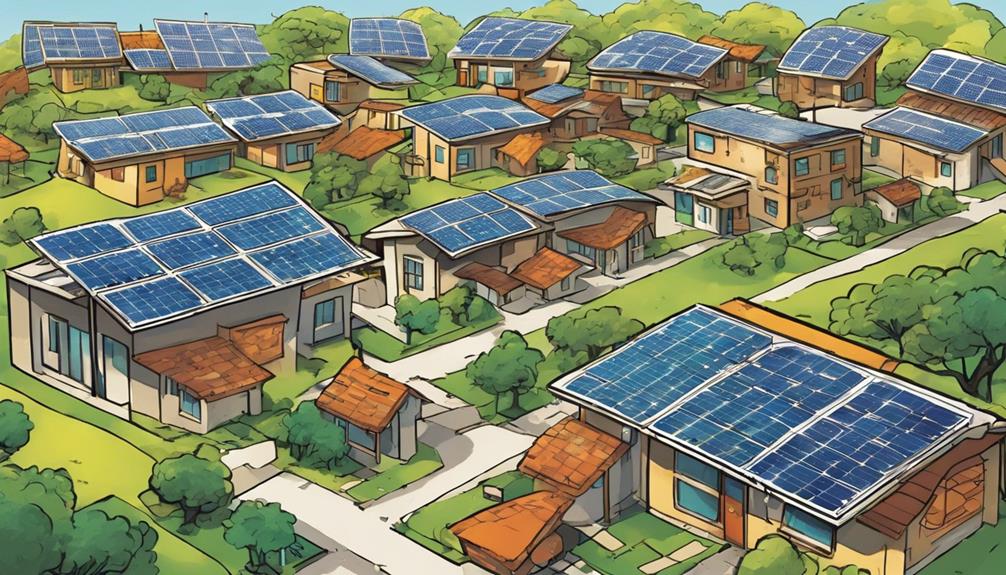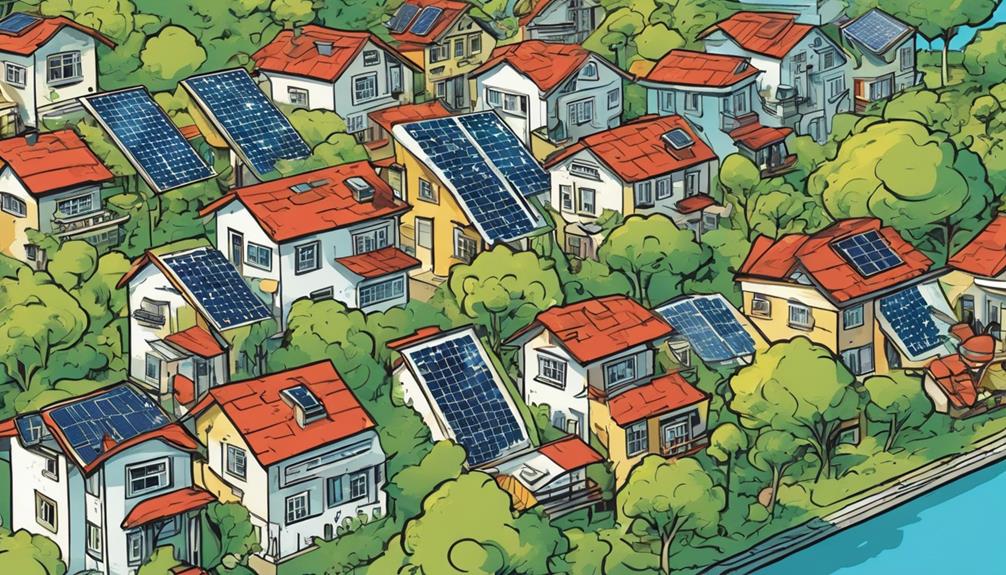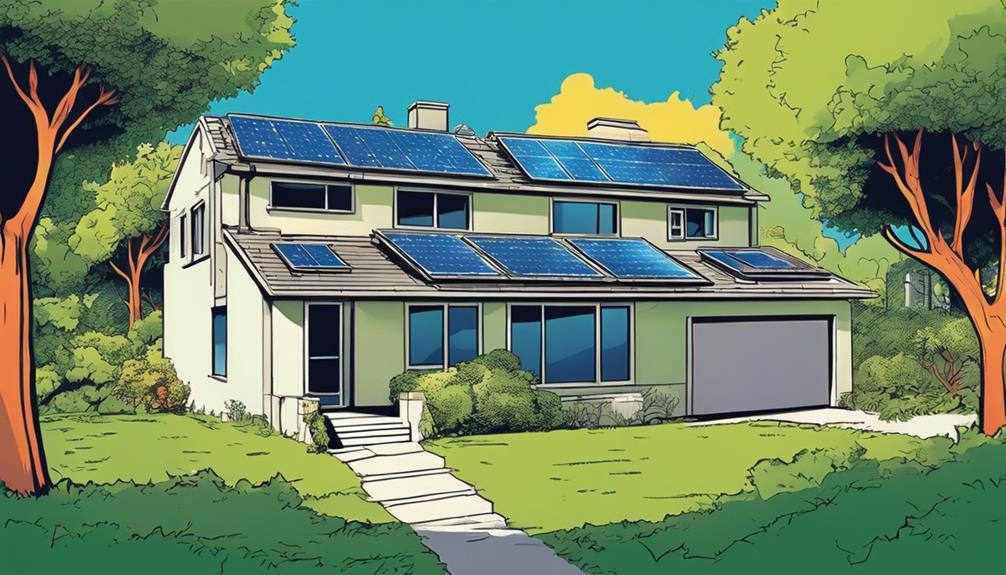Switching to solar energy benefits you in various ways: you save money on utility bills, reduce harmful emissions, boost your property value, and gain energy independence. Plus, you contribute to job creation and support a healthier environment globally. If you want to explore more advantages, keep discovering the significant impact solar energy can have economically, environmentally, and technologically!
Key Takeaways
- Reduces monthly utility bills with cost savings and financial returns.
- Decreases greenhouse gas emissions and pollutants, improving air quality.
- Increases home value by $15,000 and attracts more buyers.
- Enhances energy independence and contributes to global sustainability efforts.
- Promotes job creation and technological innovations in the renewable energy sector.
Economic Savings
Save money and increase the value of your home by harnessing the economic benefits of solar energy. By installing residential solar energy systems, you can notably reduce your monthly utility bills. The amount you save depends on factors such as your electricity consumption, system size, and sunlight exposure.
Whether you choose to purchase or lease a solar system, the impact on cost savings and financial returns can be considerable. Studies have shown that having solar panels can boost a home's value by an average of $15,000, making it a worthwhile investment.
The size and angle of your roof, along with local electricity rates, are important considerations in determining the cost savings you can achieve with solar energy. These systems are viewed as upgrades that not only provide immediate savings but also have the potential to increase the resale value of your home.
Making the switch to solar power isn't only a smart financial choice but also a step towards a more sustainable future.
Environmental Impact

Harness the power of solar energy to reduce greenhouse gas emissions and improve air quality.
Solar energy significantly reduces greenhouse gas emissions like CO2, making it a cleaner energy option. By utilizing solar power, you contribute to reducing dangerous pollutants such as sulfur oxides and nitrogen oxides, which ultimately leads to improved air quality.
Moreover, solar energy plays a critical role in decreasing particulate matter emissions, benefiting public health by lowering respiratory issues and other related health problems.
Another environmental advantage of solar energy is its reduced water consumption and withdrawal compared to traditional power generation methods. This aspect is crucial in preserving water resources and ensuring sustainable usage.
Home Value Increase

Installing solar panels on your home can greatly boost its value, potentially adding around $15,000 on average. Studies have shown that homes with solar energy systems tend to sell for more than those without, making it a smart economic investment.
Factors like electricity costs and system size can influence the premium added to your property's value, making solar energy a beneficial choice for increasing your home's worth.
Value Boost Potential
By adding solar panels to your home, you can potentially increase its value by an average of $15,000, according to research findings.
Installing a solar energy system is seen as an upgrade that can attract more buyers and enhance the property resale value. Homes equipped with solar panels often sell faster and at a premium compared to those without solar installations.
The premium associated with solar-powered homes is influenced by various market factors such as electricity rates, the size of the solar system, and the overall energy efficiency of the property.
Investing in solar energy not only offers long-term financial benefits but also has the potential to significantly boost the value of your home.
- Solar panels can increase a home's value by an average of $15,000.
- Solar energy systems are considered upgrades, attracting more buyers and enhancing property resale value.
- Homes with solar panels tend to sell faster and at a premium compared to those without.
- Market factors influencing the premium include electricity rates, system size, and overall energy efficiency.
- Investing in solar energy can be a smart financial decision, offering long-term benefits and increasing property value.
Economic Home Investment
Increasing your home's value through economic investment can be effectively achieved by installing solar panels. Solar panels are considered upgrades that can potentially increase your property value by an average of $15,000.
Studies indicate that homes with solar energy systems tend to sell for more than those without. Factors such as electricity rates and the size of the solar system can influence the premium added to your home's value.
Investing in a solar energy system is seen as a good long-term strategy for boosting property value. Additionally, the affordability of solar panels is increasing, making them a cost-effective way to enhance the value of your home.
Property Appreciation Benefit
Enhancing your property's value through the installation of solar panels brings a notable benefit in the form of increased home value appreciation. By investing in a solar energy system, you can potentially raise your home's value by an average of $15,000. This upgrade not only makes your property more appealing to potential buyers but also positions it as a more desirable and energy-efficient option in the real estate market.
Benefits of enhancing your property with a solar energy system include:
- Boosting home value through the installation of sustainable and cost-saving technology.
- Demonstrating a commitment to renewable energy sources, which can attract environmentally conscious buyers.
- Generating financial returns over the long term, as solar panels are seen as a sound investment.
- Increasing the marketability of your home by distinguishing it from others without solar energy systems.
- Enjoying the positive impact on property appreciation, as homes with solar panels tend to sell for more than those without.
Versatility and Efficiency

Solar energy's versatility and efficiency make it a highly desirable and practical option for a variety of applications. Photovoltaic panels, a key component of solar energy systems, efficiently generate electricity by converting sunlight into usable power. Solar power plants leverage different technologies to enhance efficiency and output, maximizing energy production. The minimal maintenance required for solar energy systems compared to traditional sources reduces long-term costs and increases sustainability.
One notable advantage of solar panels is their ease of dismantling and recycling, aligning with eco-friendly practices and promoting environmental responsibility. Over time, advancements in solar cell technology have notably improved efficiency, with some panels now exceeding 20% efficiency rates. This progress has made solar energy more cost-effective and accessible, driving its adoption across residential, commercial, and industrial sectors.
Embracing solar energy not only offers versatility in applications but also enhances overall efficiency and sustainability in energy production.
Job Creation

Solar energy presents a promising avenue for job creation, with opportunities spanning research, manufacturing, sales, and installation.
The sector's potential to generate 22 million jobs by 2050 underscores its significant economic impact.
Embracing solar power not only fosters sustainable energy practices but also fuels growth in the renewable energy job market.
Solar Job Opportunities
With the growing demand for solar energy, job opportunities in various sectors such as research, manufacturing, sales, and installation have expanded considerably. The solar industry is a robust field that offers a wide range of job possibilities, from hands-on installation roles to high-level research positions.
Here are some key points to contemplate regarding solar job opportunities:
- Diverse Job Opportunities: Jobs in the solar industry span from entry-level positions to specialized roles, catering to individuals with varying skill sets and experience levels.
- Projected Job Growth: The solar energy sector is expected to provide around 22 million jobs by 2050, indicating significant growth and stability in the industry.
- Employment in Installation: Solar energy installations, both residential and commercial, create numerous job openings for individuals interested in hands-on work.
- Net Metering Programs: Net metering programs incentivize solar adoption by allowing homeowners to receive credits for excess energy produced, driving further job growth within the industry.
- Economic Impact: The expansion of solar job opportunities contributes to the overall economic growth and sustainability of communities.
Economic Growth Impact
Job creation through the economic growth impact of utilizing solar energy is significant and multifaceted.
The expansion of the solar energy sector not only fosters economic growth but also generates various job opportunities. From research and manufacturing to sales and installation, the production of solar panels offers a wide range of employment prospects.
Projections indicate that by 2050, the solar energy sector could provide approximately 22 million jobs, stimulating further economic development. Additionally, the minimal maintenance requirements of solar panels, due to their lack of moving parts, contribute to a quieter work environment for employees.
Furthermore, initiatives like net metering, which allows homeowners to receive credit for surplus energy generated, incentivize more individuals to invest in solar power, consequently boosting job creation within the industry. By reducing dependence on imported oil for power generation, solar energy not only conserves foreign energy expenditures but also creates more domestic job opportunities.
Global Accessibility

Readily available across the globe, solar energy offers a sustainable and accessible power source for various regions. Here are some key points highlighting the global accessibility of solar energy:
- Renewable Energy: Solar power is a renewable resource that can be harnessed in almost any location where sunlight reaches, making it a reliable source of energy worldwide.
- Off-Grid Regions: Solar energy is particularly beneficial for off-grid regions or areas with limited access to traditional power sources, providing a decentralized and independent energy solution.
- Environmental Sustainability: By producing electricity without emitting greenhouse gases, solar power plays a crucial role in promoting environmental sustainability and combating climate change.
- Energy Self-Sufficiency: Utilizing solar energy helps communities and countries achieve energy self-sufficiency by reducing reliance on non-renewable fossil fuels and imported energy sources.
- Combatting Climate Change: Solar energy contributes to the global effort in fighting climate change by utilizing a clean and sustainable energy alternative.
Technological Innovations

Solar energy has seen significant progress in technology, leading to increased efficiency and improved storage capabilities, driving innovation in the renewable energy sector.
Solar cell efficiency has surpassed 20%, making solar systems more productive than ever. Technological advancements have revolutionized battery technology, enhancing the storage capacity of solar energy systems and enabling better energy management.
Community solar projects have emerged as a novel approach, allowing communities to collectively benefit from solar power without the need for individual installations. Additionally, advancements in roofing materials have streamlined the process of installing solar panels, making it more accessible and cost-effective.
The industry's growth, fueled by economies of scale, has further contributed to the economic viability of solar energy. These technological breakthroughs continue to propel the solar energy sector forward, offering cleaner and more sustainable energy solutions for a brighter future.
Energy Independence

Achieve greater energy autonomy and reduce reliance on external sources by harnessing the power of solar energy.
Solar energy provides a pathway to energy independence by allowing individuals and businesses to generate their electricity and reduce dependence on the grid. This shift empowers you to control your energy production and consumption, promoting self-sufficiency in meeting your energy needs.
By embracing solar power, you can't only achieve independence but also pave the way for long-term cost savings and stability in energy prices. Taking control of your energy source through solar power contributes to a more sustainable and resilient energy future.
- Reduces reliance on imported fuels and unstable energy sources.
- Enables households and businesses to generate their electricity.
- Promotes self-sufficiency by controlling energy production and consumption.
- Leads to long-term cost savings and stability in energy prices.
- Contributes to a more sustainable and resilient energy future.
Market Trends

The increasing adoption of solar energy is being driven by a shift towards sustainable energy sources in the market. In the United States, there's a noticeable uptick in the demand for solar panels installed both in residential and commercial settings. This surge can be attributed to government incentives and rebates that are making solar energy systems more accessible and appealing to consumers.
Moreover, the growing awareness of the benefits of solar energy, such as cost savings, reduced carbon footprint, and energy independence, is further fueling the market trends. Consumers are recognizing the long-term advantages of investing in solar power, driving a positive momentum in the industry.
As a result, the solar energy market in the United States is experiencing a significant boost, with more individuals and businesses opting to harness the power of the sun for both economic and environmental reasons. This trend towards solar energy signifies a promising shift towards a more sustainable and renewable energy future.
Frequently Asked Questions
What Are 5 Advantages of Solar Energy?
When you consider the benefits of solar energy, you'll discover advantages such as affordability with tax credits, savings on utility bills, power independence through storage, increased home value, and adaptability to various climates.
What Are the Pros and Cons of Solar Energy?
When it comes to the pros and cons of solar energy, it's important to weigh both sides. Solar power offers sustainability and cost savings, but installation costs and weather dependency can pose challenges.
What Are the Main Advantages of Using Solar Heating?
Reduce energy bills by up to 70% with solar heating. You'll enjoy a 20-30 year lifespan with minimal maintenance, hot water on cloudy days, eco-friendliness, and potential government incentives. Embrace solar energy for savings and sustainability.
What Are 10 Disadvantages of Solar Energy for Kids?
You may find 10 disadvantages of solar energy for kids. Consider the upfront cost, reliance on sunlight, weather impact, unsuitability for some buildings, and added expenses for energy storage. These factors can affect solar energy systems' practicality for children.
What Are the Disadvantages of Using Solar Energy Despite Its Advantages?
One of the drawbacks to extensive solar energy is its intermittent nature. The sun doesn’t always shine, so energy storage is necessary, making it expensive. Additionally, solar panels require a large amount of space, leading to land use issues. Finally, their production involves toxic materials, posing environmental risks.
Conclusion
To sum up, the advantages of using solar energy are clear and compelling. From economic savings to environmental impact, solar power offers versatility, efficiency, and energy independence.
With technological innovations and global accessibility, the market trends towards a brighter future. So, don't delay – make the switch to solar today and start saving while saving the planet!










